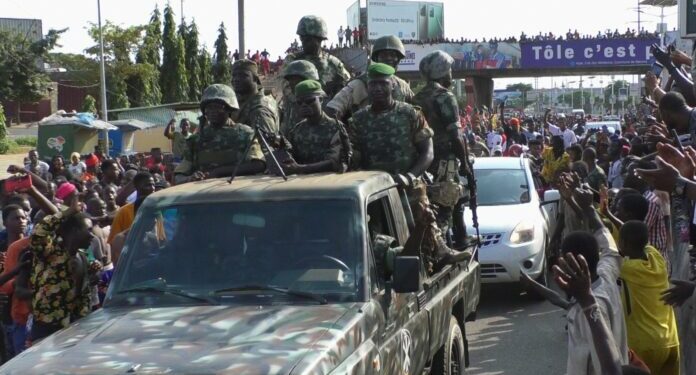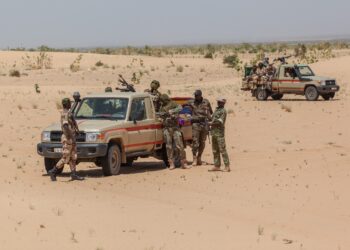Africa runs the risk of unending coups – and permanent ones at that – if the citizens of its countries make the celebration of coups d’etat the norm, Professor Abdoul Karim Sango, the former Minister of Culture of Burkina Faso has warned in an exclusive interview published by the Africa Center for Strategic Studies on 18 June 2024.
In the discourse, which touched on various subjects such as the role of culture in quelling violent extremism, African values vis-à-vis democracy and the relationship between democracy and security, Prof Sango strongly argued against coups no matter how benevolent the reason.
“We mustn’t be naive: a civilian regime can be worse than a military regime if it doesn’t respect the rules of the constitution. But we simply must prevent the army from intervening in political life through coups d’état, even if their motives may seem a priori to be sincere,” Prof Sango warned, explaining: “That’s why we see some popular support for certain coups d’état.”
“Let’s be careful not to make this the rule though, or we run the risk of permanent coups d’état,” he admonished.
Prof Sango’s warning echoes one sounded by Ghana’s President, Nana Akufo-Addo earlier this year on 27 February when he addressed Ghana’s parliament. “We must help stem the tide of this unwelcome evolution, and help entrench democracy in West Africa.” The Ghanaian leader recalled that his country has had its “fair share of political instability and experimentation about how we should govern ourselves”, noting: “There might be new names being ascribed to some of the supposed new ideas being canvassed by some today, but I daresay, on close examination, we would discover they are not new: we have tried them here, and they have failed.”
“We know about all-powerful, cannot-be-questioned Messiahs; we know about liberators, and we know about redeemers and deities in military uniform. It might sound new to some, but those of us who have been around for a while have heard the argument made passionately that democracy was not a suitable form of government if we wanted rapid development,” Akufo-Addo mentioned.
In Prof Sango’s view, what Africa needs is to work to ensure that everyone accepts the constitutional regime. “We need to include mechanisms in the constitution so that incompetent leadership or political deadlock can be resolved constitutionally,” he proposed.
Similarly, Prof Sango noted, “There needs to be a mechanism that prevents leaders from clinging to power beyond their mandates,” citing, as an example: “In the United States you have the impeachment process.” “What’s preventing Africans from having an impeachment process in their constitutions?” he wondered. To him, “If you have a security crisis that is prolonged because of the president’s incompetence, it must be possible to remove him by constitutional means without the military staging a coup d’état. That’s what we need to work towards.”
Recent Coups Celebrated by Citizens in West Africa
Some of West Africa’s recent coups were met with celebration by the citizens of those countries, reflecting widespread disillusionment with what they perceived as corrupt, incompetent and self-serving democratically elected civilian governments.
1. Mali (2020): The coup that ousted President Ibrahim Boubacar Keïta was largely supported by the population. Ordinary Malians expressed frustration with the government’s inability to handle the country’s economic woes and escalating jihadist insurgency. The military’s promise to address these issues was welcomed by 82% of the population, according to Afrobarometer (Foreign Policy Research Institute) (ON POLICY Africa).
2. Guinea (2021): In Guinea, the overthrow of President Alpha Condé by Colonel Mamady Doumbouya was met with public approval. Condé’s government was criticised for corruption and attempts to extend his stay in power beyond constitutional limits. The coup leaders capitalised on public discontent by pledging to combat poverty and corruption (Foreign Policy Research Institute) (ON POLICY Africa).
3. Burkina Faso (2022): The coup in Burkina Faso, led by Lieutenant Colonel Paul-Henri Sandaogo Damiba, received enthusiastic support from the youth. The citizens expressed disillusionment with the government’s failure to contain jihadist violence and improve living conditions. The junta’s promise of better security and governance resonated with the public (America Magazine) (ON POLICY Africa).
These coups highlight a pattern where military interventions are often perceived as solutions to entrenched issues of poor governance, corruption, and insecurity under civilian governments. However, this cycle also underscores the fragility of democratic institutions in the region, suggesting a need for deeper reforms to achieve long-term stability (Foreign Policy Research Institute) (America Magazine) (ON POLICY Africa).
To strengthen democracy on the continent, Prof Sango said the freedoms of the people must be safeguarded. “I think democracy is the hope of free people. I think that all people are inspired by freedom, and no one wants to be held in slavery. So, from this point of view, I’m not worried about the future of democracy,” he told Africa Center for Strategic Studies.
He believes the peoples of Africa must be allowed to assimilate the ideas and ideals of democracy according their own dictates. “We need to give Africans the time to go at their own pace, building authentic democracy as all the countries giving lessons today have done. African countries haven’t had a chance to build their relationship with democracy over time. We didn’t ask ourselves what model of parliament suits Africans, for example. We didn’t ask ourselves what kind of political system would be best: should the president be elected by direct universal suffrage or by indirect universal suffrage? We haven’t asked ourselves what kind of state model is best suited to African states, whether it’s a decentralised state, or a federal one, or something else. For example, I’m in favour of a highly decentralised state with real, legitimate governors at the local level, rather than officials subject to a central administration, as is the case with the Burkinabè model.”
Prof Sango underscores that what Africa needs now is to implement courageous reforms to strengthen the rules of democracy and institutions, and that, in turn, will lead to strengthened security. “We must, therefore, take very good decisions to rebuild the state and its institutions, but only by opening up an inclusive and transparent debate,” he proposed.
For example, Prof Sango said, “In principle, the 2014 uprising should have enabled the Burkinabè people to settle institutional issues for good. But the short transition period didn’t allow for this. We have to listen to the people. We haven’t done that so far. Part of the elite (including me) has monopolised the debate on strategic choices for the country’s future. But that’s not democracy. Democracy is the voice of the people, creating, from our traditions and values, spaces for mediation and deliberation.”
Precisely, Prof Sango believes Africa’s partners “need to be very clear-headed at this very difficult time, and listen carefully, so that we don’t miss the fight, but continue to build this dream of a world of peace and security,” adding: “Those in power must not allow Burkina Faso to topple over, with consequences for the entire West African sub-region. What I’m saying here has relevance for our sister countries Mali and Niger as well. It’s not enough to believe that we can consolidate security in Côte d’Ivoire or Ghana. We need to think frankly about the collective security of our states. This will require the establishment of what many citizens call ‘true democracy.’”
However, just like Nelson Mandela, Wole Soyinka, Achille Mbembe, Cheick Anta Diop, Felwine Sarr and Joseph Ki-Zerbo, Prof Sango believes democracy is not alien to Africa. He argues that it is deeply rooted in African values. “When I say that democracy is deeply rooted in African values, it’s mainly in reaction to those who claim that democracy is a value that was imposed on Africans by Westerners—and that the so-called ‘failure of democracy’ is linked to it not being part of our culture,” he explained to the Africa Center for Strategic Studies.
Democracy, Prof Sango noted, is a way of organising societies with “the idea that the population has a right to freedom” and “people should be treated equally and benefit from the same rights and civil liberties.” Secondly, he indicated that democracy entails the “idea that the authority of leaders to organise society must not be absolute.”
“In a sense, democracy can be summed up as the limitation of power by those who hold it, as well as respect for the freedom and agency of the citizenry. It is around these principles that each society defines its model of democracy and no democratic society should deviate from these principles. Taking these elements, the question becomes whether, in African societies before the colonial era, we had societies where the power of those who ruled was limited. The answer is an emphatic ‘yes!’” he argued, continuing: “And power was limited by what we call custom. Our customs emerged from the laws of traditional, pre-colonial societies. Because there was limited use of writing, these laws were widely transmitted through stories and traditions within the community.”
He illustrated: “Some African societies, according to prominent anthropologists, were based on the idea that there should not be one leader above others, opting instead for a form where all citizens were treated as equals. Such societies existed in Africa. Considering that democracy is a system in which those who govern do not wield absolute power, I can cite the African examples of Moagha, Lobi, and Gurunsi societies. Democracy is not something new or unknown in Africa before the event of colonization.”
Another example, Prof Sango pointed to, “Is the form of decision-making in traditional African societies based on consensus, commonly known as the palaver tree. Democratically speaking, I can’t think of a better way to make decisions. African societies are based on the premise that group ideals must be preserved in all situations. So, in Africa, when there’s a problem, we discuss it—men, women and young people. We listen to one another. Some authors go so far as to say that Africans have no concept of time. It’s true, Africans aren’t slaves to time. Rather, it’s time that must submit to Africans because what’s important is the cohesion of society. It’s the community that matters.”
It is “obvious,” Prof Sango argued, “That some forms of government that we inherited from colonisation have contributed to breaking these inherent social models. But we have to acknowledge that we helped to break our internal systems of organization without assessing whether it was what was best for the population. From that moment on, when we inherited a model from outside without adapting it to our values and identity, it was bound to create problems. Today, the result is that the way ‘democracy’ is practised in some countries is highly contested. And for good reason!”






























